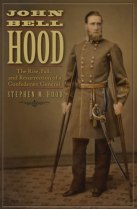 While reading John Bell Hood: The Rise, Fall, and Resurrection of a Confederate General, I realized something about myself: the more ubiquitous the application of hyperbole to an individual or event, the more willing I am to consider challenges to the established line on them. Does that make me an iconoclast? To some extent, maybe, and certainly in cases where it appears to me writers have worked backwards from their fundamental diagnoses and bent evidence to fit their conclusion. Author Stephen M. Hood makes a compelling case that this is precisely what has happened over the years with his collateral relative. I think.
While reading John Bell Hood: The Rise, Fall, and Resurrection of a Confederate General, I realized something about myself: the more ubiquitous the application of hyperbole to an individual or event, the more willing I am to consider challenges to the established line on them. Does that make me an iconoclast? To some extent, maybe, and certainly in cases where it appears to me writers have worked backwards from their fundamental diagnoses and bent evidence to fit their conclusion. Author Stephen M. Hood makes a compelling case that this is precisely what has happened over the years with his collateral relative. I think.
(It’s not hard to find “discussion” of this book on blogs and social media. Some clear thinking, some dogma, the usual “I haven’t read it, have no intention of reading it, but am happy to tell you what I think of its content” type comments. Some compelling arguments that author Hood committed some of the same crimes of which he is accusing others. Lots of folks talking past one another. Lots of pots shouting at kettles. Google to your heart’s content. You’ll find all of it out there.)
To me, the book is strongest when it points out that sources cited as support in a particular work do not say what the author of that work claims they say. Author Hood does so often. And he does so convincingly. This is why you should read the book. In my opinion.
While I’ve had Wiley Sword’s The Confederacy’s Last Hurrah (aka Embrace and Angry Wind) on my shelf for years with every intention of reading it, I don’t see how I can possibly do so now with an open mind. Many of the indictments of Sword in author Hood’s book appear so cut and dry that I have difficulty perceiving of a scenario in which reading Sword’s book will make me think, “you know, with regards to these particulars, Sword is right and author Hood is wrong.” Again, that may say a lot more about me than about Sword or author Hood. And Hood doesn’t stop at Sword. He points out weaknesses in the works of Sword’s predecessors and followers. Out of necessity writers of non-fiction build upon the work of those who have gone before. Sometimes what they accept, they accept in error. I’ve seen it in my research of First Bull Run. I imagine everyone who has researched anything has seen it as well. Sometimes it’s purposeful, sometimes it’s not, but when discovered and proven it’s always wrong and should be corrected. At least, if you ask me it should.
Of note, author Hood points out that, despite what most students of the war believe, General Hood was not overly fond of frontal attacks, and rarely employed them of his own volition. Read that again. And he backs it up, too. Hey, don’t get mad at me. Relax. Count to ten. Now, if it’s true, does that affect your overall impression of General Hood? It affected mine.
On the other hand, I found the book weakest when it reached down deep in the ranks to find contemporary Hood praises; when it presented defenses consisting of “how could all these guys say such nice things” and “well, if Hood was so bad, why don’t you think so-and-so was bad for doing the same things?” Now, in a lot of instances author Hood is right, double standards have been established, but the exposition of double standards has rarely ever done anything but dredge up the old “you’re trying to tear down our guy to build up yours” response. That is to say, it’s an emotional thing, and the consideration of cold, hard facts carries more weight. With me.
I felt the Foreword and Introduction didn’t serve the book well. I was in fact concerned about the book’s prospects after reading them – they laid out a game plan that was inconsistent with my understanding of the focus of the work. After deliberation, I determined to forge ahead. I also found the author’s attempt to discredit Jefferson Davis’s writings about and dealings with Hood, coupled with his uncritical, face value acceptance of Davis’s criticisms of Joe Johnston, to be an odd and hypocritical juxtaposition. But maybe that’s just me.
Despite these and other, as I view them, weaknesses, I think John Bell Hood is an important book, and one that should be read by anyone interested in Hood and his tenure at the helm of the Army of Tennessee, and/or historiography in general. This book will make you think, whether or not you agree with the resurrection bit in the title. For this reason, it was picked as a runner-up for best book of 2013 in Civil War Monitor. By me.
I thought about this song a lot while reading this book, and while reading discussions of this book. I think sometimes it illustrates the relationship between authors and their subjects.

Recent Comments